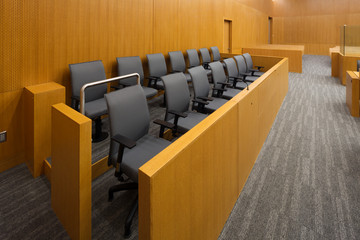
By: Amanda Leonard, Staff Writer
During jury selection for the recent El Chapo trial, one juror broke down crying in front of the judge, claiming coworkers identified her as a potential juror and she feared that public identification would follow suit.[1] The judge had previously granted requests from prospective jurors to be removed from the selection pool due to fear of identification and subsequent violence or death by friends of El Chapo.[2] U.S. District Judge Brian Cogan ordered that jurors remain anonymous and partially sequestered during the Mexican drug lord’s trial.[3] The question presented here is whether jurors have a right to privacy and anonymity, and if so, whether it can outweigh a defendant’s right to a fair trial by a jury of his peers.
The Sixth Amendment of the Constitution affords criminal defendants the right to a “public” trial with an “impartial jury.”[4] The idea of juries came from the English system, which emphasized the role of community in trying a defendant and the use of jurors that knew the parties or the facts.[5] During Colonialism, the right to a jury served as protection from unfettered rule of the Crown in the New World.[6] In the early days of American government, juror names were sometimes included on the official ruling of a judge.[7]
Two hundred years later, the first fully anonymous panel of jurors was used in the trial of fourteen defendants accused of conspiracy in a drug trafficking network in the landmark case of United States v. Barnes.[8] The circuit court judge upheld the decision, stating that the law does not require a juror to disclose his or her identity and take responsibility for the decisions made.[9] A juror cannot be free and impartial, as the Constitution requires, if he feels that he or his family will be subject to violence or death by the defendant or his friends.[10]
Courts have used five factors to determine whether the use of anonymous jury is warranted: (1) the defendant’s involvement in organized crime; (2) the defendant’s participation in a group with the capacity to harm jurors; (3) the defendant’s past attempts to interfere with the judicial process; (4) the potential that, if convicted, the defendant will suffer a lengthy incarceration and substantial monetary penalties; and (5) extensive publicity that could enhance the possibility that jurors’ names become public and expose them to intimidation or harassment.[11] Judges have noted that if anonymity is needed to protect the jurors, the court should take reasonable precautions to minimize any prejudicial effects on the defendant and to guarantee that his rights are protected.[12]
Since the 1977 Barnes decision, anonymous juries have become more common during high-profile cases in which there is a serious threat to the safety of jurors or to the integrity of the trial through juror tampering or bribery.[13] Still, some question whether a jury can be impartial if it is kept anonymous. If a jury “conflate[s] anonymity with a criminal defendant’s dangerousness, the right to a fair trial is eviscerated” and the presumption of innocence has been eroded.[14]
Privacy during the era of social networking and digital information has taken on new meaning. Personal details of individuals are now easily searchable. A juror’s right to privacy affects many aspects of our legal system and democratic society. Other concerns include which disclosures are required during the voir dire process, under what circumstances should the public have access to juror information, and how the First Amendment freedom of the press outweighs a juror’s right to privacy. The El Chapo trial is just a catalyst for discussing such privacy concerns.
Sources:
[1]Noah Hurowitz, Inside the El Chapo Trial Jury Selection, at Rolling Stone (November 8, 2018), https://www.rollingstone.com/culture/culture-news/el-chapo-trial-jury-selection-753106/.
[2]Hurowitz, supra.
[3]Vanessa Romo, Judge Rules That ‘El Chapo’ Jury Will Remain Anonymous, at National Public Radio (February 6, 2018), https://www.npr.org/sections/thetwo-way/2018/02/06/583739445/judge-rules-that-el-chapo-jury-will-remain-anonymous.
[4]U.S. Const. amend. VI, available atLegal Information Institute, Cornell Law School, https://www.law.cornell.edu/constitution/sixth_amendment.
[5]Christopher Keleher, The Repercussions of Anonymous Juries, 44 U.S.F. L. Rev. 531, 533 (2010).
[6]Id.at 533-34.
[7]The right of access to juror names and addresses, at Reporters Committee for Freedom of the Press, https://www.rcfp.org/journals/news-media-and-law-summer-2016/right-access-juror-names-an/#_ftnref4
[8]Id.
[9]United States v. Barnes, 604 F.2d 121, 140 (2nd Cir. 1979).
[10]Id. at 140-41.
[11]United States v. Ross, 33 F.3d 1507, 1520 (11th Cir. 1994).
[12]United States v. Paccione, 949 F.2d 1183, 1192 (2nd Cir. 1991).
[13]Carrie Johnson, Why Courts Use Anonymous Juries, Like In Freddie Gray Case, at National Public Radio (November 30, 2015), https://www.npr.org/sections/thetwo-way/2015/11/30/457905697/why-courts-use-anonymous-juries-like-in-freddie-gray-case.
[14]Keleher, supraat 532.